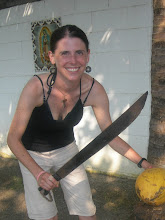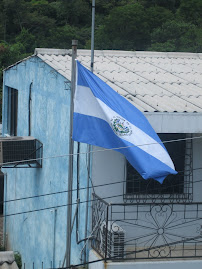
I just finished reading a book called Consider This Senora, which is about a group of foreigners who for different reasons find themselves living in a small village in central Mexico. In the end, they all move away, and one of the men of the village comments, "Their roots are shallow from frequent transplanting."
This quote really struck me because I too have been transplanted a lot. I grew up in Louisville, Ky, went to college in Boston, lived for a year in the Dominican Republic, moved back to Louisville for a year, and now I am in El Salvador. Do I have too shallow of roots to be nourished? I look at some of my cousins who all live close to one another, who have started families of their own, who have kids who play together, and I feel a little envious. I am physically far from my family and can only talk to them once and a while on skype or by email. I chose to be a missioner to become more connected to people, to reality, but am I actually becoming more disconnected by transplanting myself too often?
On top of that, I am thrown into a foreign culture, with different traditions/customs, a different spirituality, different sense of time, with food that, while tasty, can cause me to become ill, where I don't always understand what people are saying, where people stare because I look different, etc... I don't really feel like I fit in. Do I belong here? Where do I belong?
When I ask myself these questions, which happens often, I can begin to feel lost and alone, but then I have to remind myself of what one of my teachers, Sr. Peggy, told our class on liberation theology. She said that rather than asking ourselves where we belong, we should ask, "To whom do I belong?/ Whose am I?" Roots are developed in people, not just in places. Of course, it is going to take a while to develop roots in a community here. I may never belong in El Salvador, but I hope I can find a community of people to belong to.

My sense of hope comes from the ginkgo tree. Apparently, it is unknown whether or not the gingko tree (which Larry Lewis, MM, references in his book The Misfit), has a native population anywhere in the world. Whether or not it actually has a home, they are grown in many different places/environments. They are known to have a preference for disturbed sites, like rocky slopes and cliff edges, and can adapt to the harsh, urban environment with pollution and limited growing space. They are so resilient that they were among the few living things that survived the atomic blast at Hiroshima. This tree has been transplanted to many different environments, and while it may never fully naturalize itself in all of them (like in the US), it finds the nourishment it needs to thrive. Like the gingko, I am drawn also to and nourished by more disturbed environments. I just hope I have its adaptability and resilience (but not its foul odor ;)! I am ready to find my next home and plant my "gingko roots."








